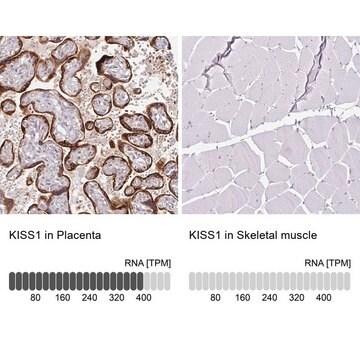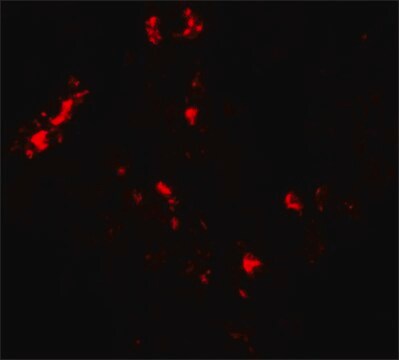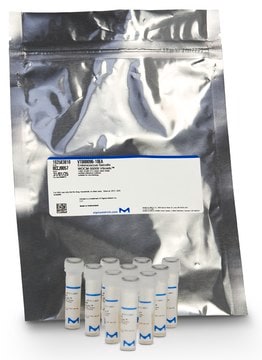AB9754-I
Anti-Kisspeptin-10
Synonyme(s) :
KISS1, Kisspeptin-1, Kisspeptin-10, Metastasis-suppressor KISS-1
Se connecterpour consulter vos tarifs contractuels et ceux de votre entreprise/organisme
About This Item
Code UNSPSC :
12352203
eCl@ss :
32160702
Produits recommandés
Description générale
Metastasis-suppressor KISS-1 (UniProt: Q15726; also known as Kisspeptin-1) is encoded by the KISS1 (also known as PP5098) gene (Gene ID: 3814) in human. KISS1 is highly expressed in placenta and some expression is also observed in testis, pancreas, liver, small intestine. Low expression levels are also observed in the brain. Its expression is shown to increase in both early placentas and molar pregnancies and are reduced in choriocarcinoma cells. Its expression is reported to be higher levels in first trimester trophoblasts than at term of gestation. KISS-1 is a secreted metastasis suppressor that demonstrates inhibition of metastases formation in several types of cancers. It is synthesized with a signal peptide (aa 1-19), which is subsequently cleaved off to generate the mature form that can also be cleaved into four chains known as Metastin (aa 68-121), Kisspeptin-14 (aa 108-121), Kisspeptin-13 (aa 109-12), and Kisspeptin-10 (112-121). Metastin acts as an endogenous ligand of GPR54, a GPCR. Activation of this receptor inhibits cell proliferation and cell migration that contributes to its tumor suppressor role. Kisspeptin-10 is reported to be a paracrine/endocrine regulator in fine-tuning trophoblast invasion generated by the trophoblast itself and increases intracellular Ca2+ levels in isolated first trimester trophoblasts. KISS1 expression is reported to be significantly reduced in human pancreatic cancer tissue and this reduced expression is associated with advanced disease. KISS1 also diminishes MMP9 expression by effecting reduced NF-kB binding to the promoter.
Spécificité
This rabbit polyclonal antibody detects Kisspeptin. It targets an epitope within Kisspeptin-10 at the C-terminal region.
Immunogène
KLH-conjugated linear peptide corresponding to 10 amino acids from the C-terminal region (Kisspeptin-10).
Application
Immunohistochemistry (Paraffin) Analysis: A 1:1,000 dilution from a representative lot detected Kisspeptin-10 in human placenta tissue sections
Note: Actual optimal working dilutions must be determined by end user as specimens, and experimental conditions may vary with the end user
Note: Actual optimal working dilutions must be determined by end user as specimens, and experimental conditions may vary with the end user
Qualité
Evaluated by Western Blotting in HL-60 cell lysate.
Reconstitution
1.0 mg/mL. Please refer to guidance on suggested starting dilutions and/or titers per application and sample type.
Stockage et stabilité
Stable for 1 year at +2°C to +8°C from date of receipt.
Autres remarques
Purified rabbit polyclonal antibody in buffer containing 0.1 M Tris-Glycine (pH 7.4), 150 mM NaCl with 0.05% sodium azide
Clause de non-responsabilité
Unless otherwise stated in our catalog or other company documentation accompanying the product(s), our products are intended for research use only and are not to be used for any other purpose, which includes but is not limited to, unauthorized commercial uses, in vitro diagnostic uses, ex vivo or in vivo therapeutic uses or any type of consumption or application to humans or animals.
Code de la classe de stockage
12 - Non Combustible Liquids
Classe de danger pour l'eau (WGK)
WGK 2
Point d'éclair (°F)
Not applicable
Point d'éclair (°C)
Not applicable
Certificats d'analyse (COA)
Recherchez un Certificats d'analyse (COA) en saisissant le numéro de lot du produit. Les numéros de lot figurent sur l'étiquette du produit après les mots "Lot" ou "Batch".
Déjà en possession de ce produit ?
Retrouvez la documentation relative aux produits que vous avez récemment achetés dans la Bibliothèque de documents.
Notre équipe de scientifiques dispose d'une expérience dans tous les secteurs de la recherche, notamment en sciences de la vie, science des matériaux, synthèse chimique, chromatographie, analyse et dans de nombreux autres domaines..
Contacter notre Service technique








